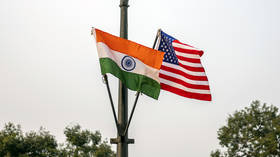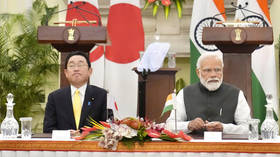Biden says India ‘shaky’ on response to Russia

US President Joe Biden has accused India of being “somewhat shaky” in its response to Russia’s attack on Ukraine, while praising the “extremely strong” reactions by other regional allies such as Japan and Australia.
Speaking to a business forum on Monday, the president suggested India has not done enough to punish Russia for its military operation, according to Reuters, comparing New Delhi to the other members of the Indo-Pacific ‘Quad’ alliance, which also comprises Washington, Tokyo, and Canberra.
Biden said the security bloc had issued “extremely strong” condemnations following Moscow’s assault on Ukraine, “with the possible exception of India being somewhat shaky on some of these [issues].”
In later comments to India’s NDTV, US Undersecretary of State for Political Affairs Victoria Nuland argued that “Democracies need to stand together and evolve their position vis-a-vis Russia,” and to “stand against autocracies like Russia and China,” adding that this position had been reiterated to Indian officials.
While the United States and a number of allies have pressured India to sever its friendly ties with Moscow, pushing it to join an international sanctions campaign, New Delhi has been hesitant to give in to that demand, refusing to vote to condemn Moscow at the United Nations and even reportedly agreeing to boost its imports of Russian oil at a discount last week.
Following a virtual meeting between India and Australia’s prime ministers this week, the Indian Foreign Ministry said that Canberra understood its position on the Russia issue, which “reflected our own situation, our own considerations.”
Other nations, including China and even NATO members Hungary, Germany, and the Netherlands, have also offered some resistance to the sanctions spree. Despite going along with some of the penalties, the latter three countries challenged a European initiative to place a full-blown embargo on Russian energy earlier this week, voicing concerns it could harm their own oil, gas and coal supplies. Pakistani PM Imran Khan also recently rejected similar Western pressure, saying “I haven’t bowed before anyone and will not let my nation bow either.”
Moscow attacked the neighboring state in late February, following a seven-year standoff over Ukraine’s failure to implement the terms of the Minsk agreements, and Russia’s eventual recognition of the Donbass republics in Donetsk and Lugansk. The German- and French-brokered Minsk Protocol was designed to regularize the status of the regions within the Ukrainian state.
Russia has now demanded that Ukraine officially declare itself a neutral country that will never join NATO. Kiev insists the Russian offensive was completely unprovoked and has denied claims it was planning to retake the two republics by force.













